As coordinators and members lack training, education, and knowledge of the law, the committees have failed to fulfil their mandate.
Bimala Gupta: Centre for Investigative Journalism -Nepal
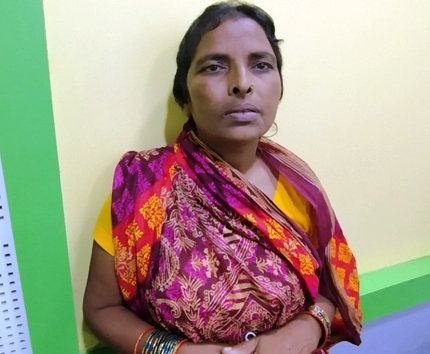
Umadevi Thakur, 48, tonsured and tortured by villagers, including Subhas Sah, who is one of the taskforce members of Chipharmai Ruralmunicipality.
On July 15, 2020 a 48-year-old single woman from Parsa’s Chhipaharmai Rural Municipality was paraded around the village. She was half-naked, and her head was tonsured during the parade. She was accused of witchcraft by eight people, including Subash Shah Kanu, a member of the rural municipality.
The other seven people who attacked the woman are Sanjay Giri, Munnilal Pardesi, Sandhya Devi, Indu Devi, Jitendra Thakur, Rahul Thakur and Rajdev Sharma. Parsa Police Office has arrested Pardesi, Sharma, Sandhya and Indu. Shah, Giri, Rahul and Jitendra are still on the loose.
Nabin Singh, a local, said, “The police filed a case against all eight people for the inhuman treatment of the woman. But since Pradesi contracted Covid-19 inside custody, the judicial process has halted for the time being.
Shah and others had attacked the woman seven months earlier as well. Since Shah was elected on the ticket of the Nepal Communist Party, the issue had been sidelined for a long time.
Even though a single woman was attacked, there has been no effort by Modina Khatun, coordinator of the judicial committee of the rural municipality. Her husband, Shamsul, receives her mobile phone calls. Shamsul, who comes to the municipality office regularly, said, “Tell me if you have any work with the deputy chief. I’ll get it done.”
The incident in Chhipharmai exemplifies the role of judicial committees of the mid-Terai region. Other local levels are no better.
On July 3, 2020, Rajesh Kumar Chaurasiya, deputy chief of the Kalikamai Rural Municipality and coordinator of the judicial committee, visited the District Police Office along with his accomplishes to get his nephew, Dhirendra Chaurasiya, release from custody where he had been kept on charges of violence.
Dhirendra had attacked Raju Kumar Chaurasiya, a local of Ward-2, on the night of May 23, 2020, for not installing an electric switch on a roadside. Ram Babu Chaurasiya, the father of the victim, said, “Who’ll speak for us? My son was attacked verbally and physically. Now they’re trying to close the case by paying us treatment fees. How’s that justice?”
The victim said he had to knock the doors of the DPO after he failed to get justice from the judicial committee. But the coordinator of the committee came to the police office to get the case closed. Chaurasiya, the coordinator, said, “The villagers don’t listen to us. They just go to the police.”
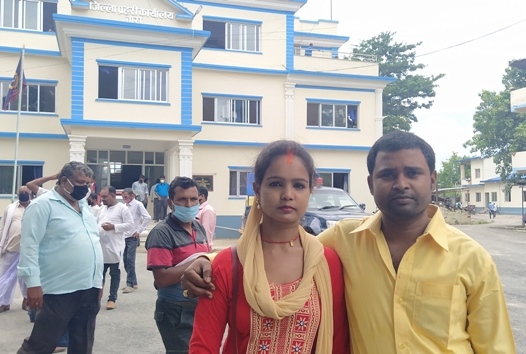
Arati Sah and her husband Chandanm Sah of Prasauni Ruralmunicipality at the District Police Office after Bholaprasad Sah, the wardchairperson sided with the guilty. Aarti has no faith left in the judicial committee anymore.
A woman from the Kalaiya Sub-Metropolitan City-5, Barewa in Bara District was sexually assaulted by Umesh Yadav, the son of Bikram Yadav. Bikram is the chief of Ward-8.
He also attacked the father-in-law of the victim who had protested against the assault on his daughter-in-law. The victim’s husband also came out in protest. The victim and her family visited the judicial committee for justice, but the committee dilly-dallied. They then went to the District Police Office for complaint. No action has been taken against the perpetrators yet.
“We’re poor, illiterate farmers. The ward chief says he can’t help. Who’ll give us justice now?” said the victim’s husband.
However, Yadav said his son had been framed for money, and that he had resolved the issue by paying Rs20,000 in the witness of villagers.
Aarati Sah of Prasauni Rural Municipality-3 in Bara District is a mother of two daughters. She had divorced her husband five years ago. After the divorce, she got married in a court with another man named Chandan Sah.
But when she tried to visit her husband’s home three years after the marriage, she was threatened for marrying outside of caste. She was threatened by her relatives Bir Singh Sah, Dhanesh Sah and Hari Sah along with Bhola Sah, the chief of the rural municipality.
When Aarati tried to seek justice from the judicial committee, Bhola Sah stood in support of the accused. Geeta Sah, the coordinator of the committee, gave verbal assurance but failed to deliver on the judicial process due to pressure from the chief. Ultimately, Aarati filed a complaint at the District Police Office on July 3, 2020, asking to be allowed to go home.
“I had to go to the police because the committee didn’t provide justice to me,” Aarati said.
Drama in the judicial committee
The role of the judicial committee in Rautahat District’s Gaur Municipality seems pretty ineffective. Kiran Thakur, the ordinator of the committee, has experience working for women, children and senior citizens. But she could not put her experience into practice in her work as the coordinator.
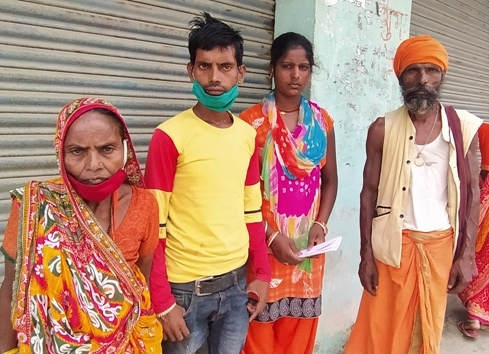
Santosh Sah from Dobani Ruralmunicipality and Urmila Kumari from Paterwa, Sugauli with her parents outside the Parsa District Court after the village judicial committee failed to provide a recommendation letter for marriage.
The committee received 14 cases in the fiscal year 2017/18, out of which none was solved. In 2018/19, it received 82 cases, out of which 25 were solved. And in 2019/20, it received 28 cases, out of which eight were solved.
“Since registering the cases takes money, we solve them by registering. We register only the cases related to a property dispute. That is why the number of registered cases is quite less,” Thakur said.
The situation of the district’s Rajpur Municipality is no better. Japhira Khatun, the deputy chief of the municipality and coordinator of the committee, does not know anything about the responsibilities of the committee. That is why the committee is not functioning properly. In Khatun’s absence, the work of the committee is done by Aditya Nath Jha, an employee of the municipality.
According to Jha, the committee, which was formed in 2017, had started work from the fiscal year 2019/20. In that year, the committee registered 50 cases, out of which only 32 were closed. “The reason why many cases do not reach the judicial committee is because villagers solve disputes within the village itself. Moreover, many do not even know about the existence of judicial committees.”
In the Katahariya Municipality in Rautahat District, the judicial committee has not done any work even after three years of formation due to the disagreement between mayor Siyaram Kushwaha and deputy mayor Noor Jahan Khatun.
Khatun claimed no judicial committee had been formed whatsoever. “The mayor says he wants to operate the committee his way. That is why the committee has not been formed yet,” Khatun said.
Kushwaha, on his part, said the committee had been formed but was yet to come into operation because of the deputy mayor. “The city convention has already formed a committee with a coordinator and two members. So I have no role in this, and I am not aware of any work that has been done, if any, by the committee,” Kushwaha said.
The disagreement between the chief and deputy chief in local levels is not a new occurrence in Madhes. But that has hampered the formation and performance of judicial committees.
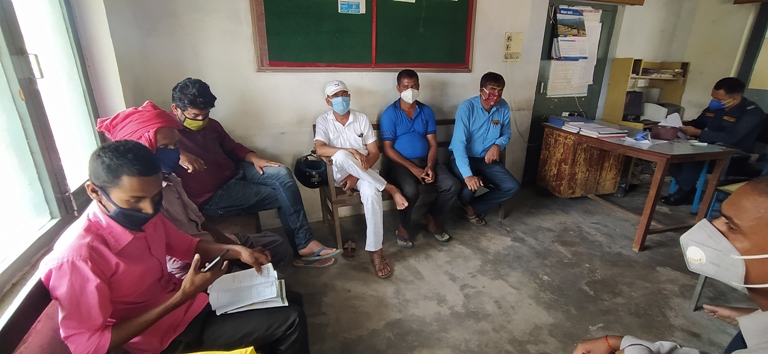
Locals complaining about the judicial committee in Parsagadhi Municipality in Parsa District not being unable to fucntion properly.
Ram Pati Mahato, coordinator of the judicial committee in bara District’s Devtal Rural Municipality, said, “Our committee hasn’t done any work.” Mahato seemed to have no idea about the formation and roles of the judicial committee.
The judicial committee in Paroha Municipality in Rautahat District suffers from a similar predicament. Three years after its formation, it is not in operation yet, and has not earned the confidence of service seekers. On July 23, 2020, the office of the deputy mayor and coordinator, Sugandha Giri, was padlocked. When the office staff opened the lock, the office was found to be in a disarray–stuffy room and sacks strewn around on the sofa. Pawan Patel, a resident of ward-9, said, “The deputy mayor comes only once or twice in a month. How, then, can you expect the committee to function?”
M. Moti Rahman, public information officer at the municipality, conceded that the committee was not functioning properly. He said no cases had been forthcoming as people solved their disagreements in the village itself. “The ward chiefs are capable of handling disputes in the ward level itself.” Rahman added.
The judicial committee of Rautahat District’s Baudhimai Municipality has been rendered worthless as it has not been brought into operation after it was set up in 2017. This has happened due to a lack of coordination between mayor Rajeev Ranjan Yadav and deputy mayor Premlata Kushwaha. “I tried my best to bring it into operation, but my sole efforts did not yield results,” said Kushwaha.
Kushwaha said the operation had been delayed due to the lack of budget and staff. “The staff members do not listen to me but to the mayor,” the deputy mayor lamented.
Anshu Singh, deputy mayor and judicial committee coordinator of Rautahat District’s Rajdevi Municipality is also the coordinator of the Deputy Mayors’ Rights Protection Committee. But her municipality is yet to bring the judicial committee into operation. “I’ve requested for staff and legal advisor for the judicial committee several times, but my requests have fallen on deaf ears. Everyone is just interested in constructing new roads, and nobody is serious about bringing the judicial committee into operation.”
Shanti Karki, deputy mayor of Birgunj Metropolitan City and coordinator of the City’s judicial committee, announced that she was dissolving the committee on June 24, 2020, claiming that she was not satisfied with its work. “I can dissolve the committee and organise another election. No matter which party the members belong to, they should be fit for the committee. The judicial committee is not needed if there is no election for the members,” Karki said.
Dhan Bahadur Thapa, grievances redressal officer of the committee, said the committee had failed to come into operation due to the lack of coordination among the mayor, the deputy mayor and the members of the committee. “You can’t expect the committee to function if the members do not even meet.”
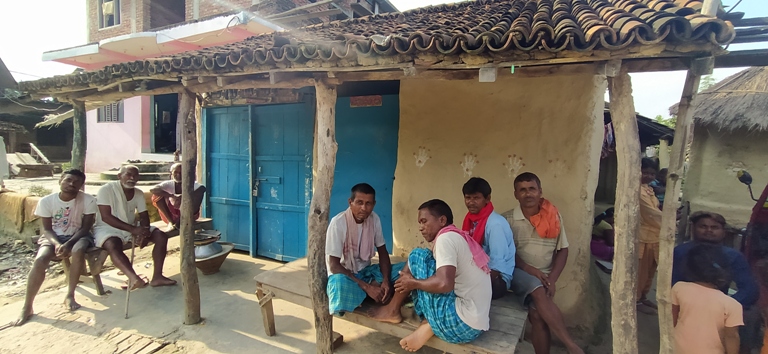
Locals complaining about the judicial committee in Parsagadhi Municipality in Parsa District not being unable to function properly.
The number of cases being registered at the judicial committee in Birgunj Metropolitan City is decreasing each year. In the fiscal year 2017/1, the committee received 131 cases and closed 53 of them; in 2018/19, it received 79 cases and closed 35 of them; and in 2019/20, it received 55 cases and closed seven of them.
The Pakahamainpur Rural Municipality has a grand judicial committee and courtroom, But it is difficult to find Kushmi Devi, the deputy chief of the rural municipality and the coordinator of the judicial committee, in her office. According to Sanjay Ram, a staff member at the cases section of the committee, the committee was formed in January 2017 itself but no case was registered with it until April 2020. As of now, it has registered nine cases out of which none has been closed. “Only those cases are registered that the coordinator asks us to register,” he said.
On her part, Kushmi Devi claims she has become a victim herself. She has had disagreements with Bijay Chaurasiya, the chief of the rural municipality, on the issue of budget allocation. The judicial committee received Rs500,000 in the last financial year. “I settle disputes between people verbally by helping them reconcile,” said Kushmi Devi, who is also the mother of Madhesh Movement martyr Shatrudhan Patel.
Similarly, the judicial committee at Parsagadhi Municipality in Para District has failed to close even a single case as of now. Archana Chaudhary, the coordinator, is well educated. But she has also failed to ensure that the committee functions properly. According to mayor Lok Narayan Yadav, the committee received 23 cases in the fiscal year 2017/18; 24 cases in 2018/19; and 10 cases in 2019/20. None of the cases has been closed so far.
Rahima Khatun, the coordinator of the judicial committee at Kalaiya Sub-Metropolitan City in Bara District, said the committee had been unable to function due to the lack of staff. In the fiscal year 2018/19, the committee registered 36 cases, out of which 14 were solved, five were deferred and five were dismissed. Four other cases are sub-judice and eight have been forwarded to the court.
The record of cases registered in the fiscal year 2019/20 are kept haphazardly, in a piece of paper. Khatun, the coordinator, said, “The situation was worse earlier. I did not know anything in the beginning. Things started getting easier after we employed a lawyer and other staff members.”
The Simraungadh Municipality in Bara District is in a similar condition. The committee was formed in 2017. Service seekers can’t meet Rima Devi, the coordinator, in her office. She was not in office when this reporter visited her office at 3 pm on July 5, 2020. Rima Devi also has disagreements with Bijay Shankar Yadav, the mayor, on the issue of budget allocation. Suresh Prasad Yadav, a staff member at the municipality, said the delay was due to the lack of coordination between the mayor and the deputy mayor.
The committee began taking case registrations from August 19, 2020. In the fiscal year 2018/19, it received 76 cases, out of which it solved 41 cases. In 2019/20, it solved 26 cases, out of which it has not solved even one. Rima Devi, the coordinator, said, “There are no staff members. What can I do? When we send letters to the defendants, they tear the letter apart and throw it.”
Mounting pressure on police and judiciary
Data from the District Police Office, Parsa show the flow of cases has increased threefold in the past three years after judicial committees were formed at the local level. As per the data, the office received 7,002 complaints in the fiscal 2019/20. In 2017/18, which was also the first year of the judicial committees, the office received 2,696 cases.
The District Police Office, Bara has also seen an increase in the number of cases that are to be dealt with by judicial committees. In the fiscal year 2019/20, the office received 3,179 cases. Similarly, it received 2,915 cases in 2018/19 and 2,133 cases in 2017/18.
According to Krishna Kumar Pangeni, police superintendent of Bara District, cases related to an irrigation canal, land issues, and marital issues that should be dealt with by judicial committees are being sent to the police, then the Office of the CDO, and finally the District Court. “Since judicial committees are not active and there is little faith in such committees in the Madhes, the victims are still visiting the police and the Office of the CDO,” Pangeni said.
Reasons galore
Judicial committees are the courts at people’s doorsteps. Section 217 of the constitution has mandated forming a three-member judicial committee under the coordination of the deputy-chief of each local level. The committees are formed at local levels to ensure that no one becomes deprived of justice.
However, judicial committees at many local levels including in Bara, Parsa and Rautahat have not started their work as yet. Reconciliation committees too are yet to be formed in several places. To receive training from the Reconciliation Council, members of the judicial committee have to be literate. But the members of most of the reconciliation centres are illiterate. Even the coordinators of several judicial committees are either semi-literate or illiterate altogether.
During a visit between the third week of June 2020 to the third week of August 2020 to observe the work of the judicial committees in local levels of Bara, Parsa and Rautahat, the coordinators of most such committees were absent from the office even during office time.
Most such offices were padlocked. Where the deputy-chiefs of the local levels are women, their husbands or male members of the family were seen to be calling the shots. The public complained that the coordinators of several judicial committees act as if they are judges themselves.
It was observed that several reasons such as the quarrel between the chief and deputy-chief of local levels, lack of budget and skilled staff, lack of qualification among the coordinator and members, and the lack of performance have made the committees ineffective. According to senior advocate Ramarani Shrestha, “The coordinator and members of the committee lack legal knowledge and have not received any training. Moreover, several of them are illiterate. Add to that the lack of monitoring of the committee by another agency, what you have are judicial committees that are meaningless and worthless.”



